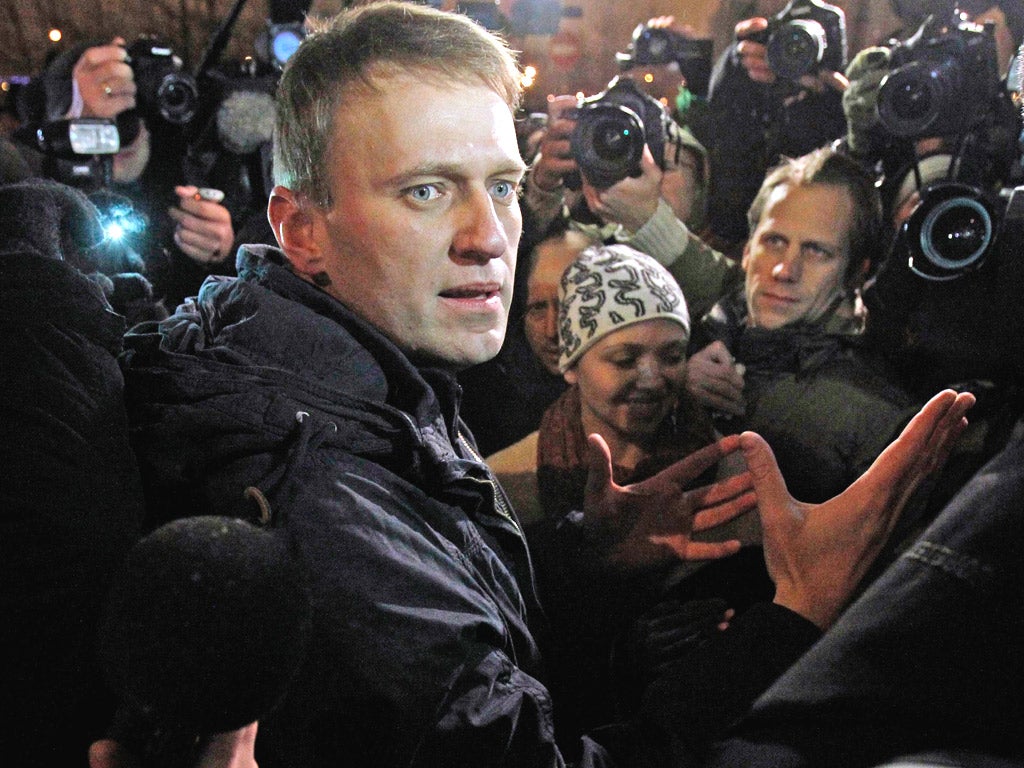Putin's rival freed to fight another day
Leading activist jailed during protest over alleged vote-rigging able to attend follow-up rally

Your support helps us to tell the story
From reproductive rights to climate change to Big Tech, The Independent is on the ground when the story is developing. Whether it's investigating the financials of Elon Musk's pro-Trump PAC or producing our latest documentary, 'The A Word', which shines a light on the American women fighting for reproductive rights, we know how important it is to parse out the facts from the messaging.
At such a critical moment in US history, we need reporters on the ground. Your donation allows us to keep sending journalists to speak to both sides of the story.
The Independent is trusted by Americans across the entire political spectrum. And unlike many other quality news outlets, we choose not to lock Americans out of our reporting and analysis with paywalls. We believe quality journalism should be available to everyone, paid for by those who can afford it.
Your support makes all the difference.The rapidly emerging leader of protests against Vladimir Putin was released from jail yesterday, as the opposition gears up for a rally in Moscow on Christmas Eve which will reveal whether the unrest is the start of something more serious.
Alexei Navalny, a blogger, activist and anti-corruption campaigner, was jailed after a protest on 5 December, the day after elections gave Mr Putin's United Russia 49 per cent of the vote amid widespread claims of vote rigging.
Mr Navalny was among several hundred protesters detained, and was jailed for 15 days along with other opposition leaders, missing a protest the following weekend when 50,000 Muscovites came out to a central square to demand fresh elections. Its scale was unprecedented in recent Russian history.
After his release, Mr Navalny said: "I was arrested in one country, but feel like I have been released into a completely different one. Our aim is the same: to cancel the election results and change the law so the opposition can take part."
The opposition will hold a follow-up rally in Moscow on Saturday to reiterate their demands, with 38,000 Russians indicating on Facebook that they will attend. Many protesters have been irritated by Prime Minister Putin's response to the rallies. He suggested that people had been paid to attend, and said that the white ribbons worn as a symbol looked like "condoms".
He also quoted Rudyard Kipling's The Jungle Book, calling the protesters "Bandar-logs", unruly monkeys marching to be eaten by a python. Many analysts have suggested that Mr Putin's dismissal of grievances against him might prove a catalyst for the protest mood.
Mr Putin will stand for a return to the presidency in March. But while he is still almost certain to win, what was expected to be a formality is looking like it could be more of an ordeal for Russia's tough-talking leader.
Mr Navalny will not be able to stand for president, having been jailed during the period when any official application needed to be made. He said yesterday that he would not stand in elections that he knew in advance would not be fair. The activist is still only known to a relatively small group of internet-savvy Russians, but his popularity is growing. "I can't help feeling that today we saw our very own 'Boris Yeltsin on a tank' moment," said Mitya Aleshkovsky, a photographer, of Mr Navalny's release, referring to the moment in 1991 when Mr Yeltsin stood atop a tank in Moscow to defy a hardline coup.
Long beset by fractious arguments, the opposition appears to have found itself a promising leader in Mr Navalny, even if his strong Russian nationalist rhetoric leaves some of the liberal leaders feeling uneasy.
An opposition leader, Vladimir Milov, said he was left with "a bitter taste of disappointment" that Mr Navalny would not be on the presidential ballot. He added, however, that Mr Putin's dismissive rhetoric about the protesters would only increase the "mood of mutiny", and suggested that the Prime Minister could "turn from the main pillar of stability of the Russian political system into the main factor behind its destabilisation".
The authorities have been trying to discredit the protests through a number of means.
Boris Nemtsov, one of Russia's main opposition leaders, has accused Kremlin agents of illegally bugging his phone after a newspaper released recordings of his private calls.
The material was potentially damaging for Mr Nemtsov, who has since apologised, as he can be heard insulting fellow opposition leaders and belittling his supporters as "internet hamsters" and "scared penguins".
At the rally a fortnight ago, it was clear that the majority were not there to back specific leaders, and Alexei Venediktov, of the liberal Ekho Moskvy radio station, said that the alleged bugging may fire people up. "I think more people will come, because everyone has put themselves in Nemtsov's place and realised that their telephones could be bugged and leaked to the media," he said. "This breach of the constitution makes every citizen feel vulnerable."
Join our commenting forum
Join thought-provoking conversations, follow other Independent readers and see their replies
Comments